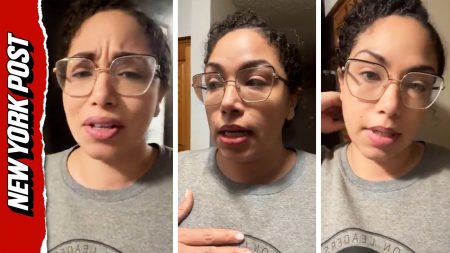US Department of Justice Threatens Buncombe County with Investigation Over Reparations Recommendations
Letter comes one day after Reparations Commission briefed county on its proposals.

By Andrew R. Jones and Dan Dewitt, Asheville Watchdog –
Citing potential violations of federal civil rights laws, the US Department of Justice has sent a letter to Buncombe County threatening to investigate and take enforcement against the county if it approves recommendations from the Asheville-Buncombe Community Reparations Commission, according to a DOJ letter obtained Friday, September 5, 2025, by Asheville Watchdog.
The letter from Harmeet K. Dhillon, assistant attorney general of the DOJ’s Civil Rights Division, was addressed to the Buncombe County Board of Commissioners and copied to Asheville City Council members.
The letter dated September 4, 2025, came one day after the Reparations Commission briefed Buncombe commissioners at their regular meeting about its final report. The commission was created in March 2022 as part of Asheville’s historic effort to provide reparations for Black residents who had suffered systemic racism across generations.
The final report included 39 recommendations in five areas: criminal justice, economic development, education, health and wellness, and housing.
“The US Department of Justice, Civil Rights Division has recently become aware of concerning recommendations presented to you by the Asheville-Buncombe County Community Reparations Commission,” the DOJ letter read.
“After our initial review, we are deeply concerned that many of the recommendations, if implemented, would violate federal civil rights laws,” the letter continued, citing both the federal Fair Housing Act and the Equal Protection Clause of the Fourteenth Amendment to the US Constitution.
The letter noted the Reparations Commission is scheduled to “present its recommendations to the City of Asheville on September 9, 2025.”
The letter stated that it appeared that the county intends to formally adopt the recommendations.
“According to media statements by the county’s Chief Equity and Human Rights Officer, Dr. Noreal F. Armstrong, the county has already set aside more than $2.9 million toward implementing the recommendations,” the letter stated. “My office will be closely monitoring your actions. To the extent these recommendations are formally adopted, you are now on notice that my office stands ready to investigate and enforce violations of federal civil rights laws to the fullest extent possible.”
A DOJ spokesperson said the department would not comment on the letter.
County Commission Chair Amanda Edwards said she didn’t know about the letter until The Watchdog contacted her. Other commissioners did not respond to The Watchdog’s request for comment.
When asked for comment, Buncombe spokesperson Kassi Day initially said that the commissioners had not received the letter because the email address was incorrect and noted the county was working to authenticate the document.
Later on the afternoon of Friday, September 5, Day sent a statement that said the county’s legal team had received and verified the letter after contacting the DOJ.
“The Reparations Commission presented their recommendations during a Sept. 2 briefing and no additional actions are scheduled at this time,” Day’s statement said.
“Our ongoing focus is on transparency and recovery from Tropical Storm Helene and its devastating effect on our community. Buncombe County has been and will always follow the letter of the law and will continue to comply with all federal anti-discrimination regulations.
“It appears no response was requested from the County, and we want the community to know that Buncombe County Government understands the oversight and monitoring of these recommendations as we strive to meet the needs of everyone in our community.”
City spokesperson Kim Miller said the City Council had the letter and is determining next steps.
“A letter addressed to the Buncombe County Commission was shared with the City Council on the evening of September 4,” Miller said. “Council has not yet formally received the Community Reparations Commission recommendations. That will take place at the Tuesday, September 9 Council meeting. City Council will then consider if any actions will be taken on recommendations that fall within the purview of the City.
“Our legal team will advise the City Council and staff on the legality of the Commission recommendations, in order to ensure compliance with current law. Because the letter was not addressed to the City of Asheville, nor was any response requested, the City does not anticipate providing one at this time.”
The Reparations Commission report said the “city of Asheville and Buncombe County took a historic step by passing resolutions to launch a Community Reparations process addressing the enduring harms of systemic racism. This bold action positioned the region as a national leader in reparative justice.”
The report also said the recommendations intended to “repair generations of harm experienced by Black residents across five key areas: criminal justice, education, housing, economic development, and health & wellness.”
The Commission’s recommendations included “establishing a Black wealth-building fund, creating community land trusts, expanding access to culturally responsive healthcare, reimagining school curricula to reflect Black history, and transforming public safety systems. The recommendations also call for ongoing accountability through a permanent reparations oversight body.”
The economic development recommendations specifically call for establishing “business corridors with commercial space for Black-owned businesses and community services in close proximity to Black neighborhoods,” and creating a private fund that could “provide direct cash payments to individuals harmed by racial discrimination.”
Among the proposed educational reforms are an effort to recruit Black teachers and encourage Black students to enroll in Advanced Placement and other academically challenging programs, as well as “teaching inclusive, historically accurate, diverse education within schools.”

Dwight Mullen, a retired University of North Carolina Asheville political science professor and the former chair of the Reparations Commission, said its recommendations were clearly supported by evidence generated in an exhaustive years-long process that included extensive community input as well as the hiring of a consultant to quantify the impact of racial injustice.
The findings also parallel a decade’s worth of reports researched and written by his students for the State of Black Asheville initiative.
“There’s consistency there, and the Trump administration has responded by, well, let’s cut off the data … because somehow that’s racist,” he said.
Still, Mullen said, his initial impulse is to advise the county to temporarily table the decision about whether to support the recommendations because the legal fight would sap the limited funds available to address the results of racial injustice.
“The resources we have can’t compare to the resources that can be marshaled by the federal government,” he said. “It’s an unfair fight.”
The DOJ’s threat comes as the Trump administration has abolished DEI policies and programs across a variety of institutions. In March, the city of Asheville’s Housing and Urban Development’s $225 million plan for disaster recovery fell under similar scrutiny because it prioritized assistance for Minority and Women Owned Business.
One day before Dhillon issued her letter, she posted on X, “The folks in Buncombe County and Asheville NC have heard from @CivilRights tonight. If they pass an illegal, race-based program, they will Find Out … we are serious about ending DEI racism in America!”
The post was in response to a post, tagged to Dhillon’s office, from the far-right Libs of TikTok’s account, which blasted the reparations commission’s proposals while including a number of inaccuracies. The Libs of TikTok post also included a screenshot not from the reparations recommendations but from 2024’s Cease Harm Comprehensive Assessment Impacting the African American Community. The assessment was done for Buncombe County and the city of Asheville by a Florida-based outside consultant.
“How is this real,” Libs of TikTok posted. “Asheville, NC passed a $2.9 million reparations policy. Includes free transportation only for Black pregnant women and funding for housing only for Black people. This isn’t legal!”
Contrary to the Libs of TikTok post, the city of Asheville has not passed a reparations policy.
Reprinted courtesy of the Asheville Watchdog. Read the original article at avlwatchdog.org/u-s-department-of-justice-threatens-buncombe-county-with-investigation-over-reparations-recommendations.
Asheville Watchdog is a nonprofit news team producing stories that matter to Asheville and Buncombe County. Read more at avlwatchdog.org.





